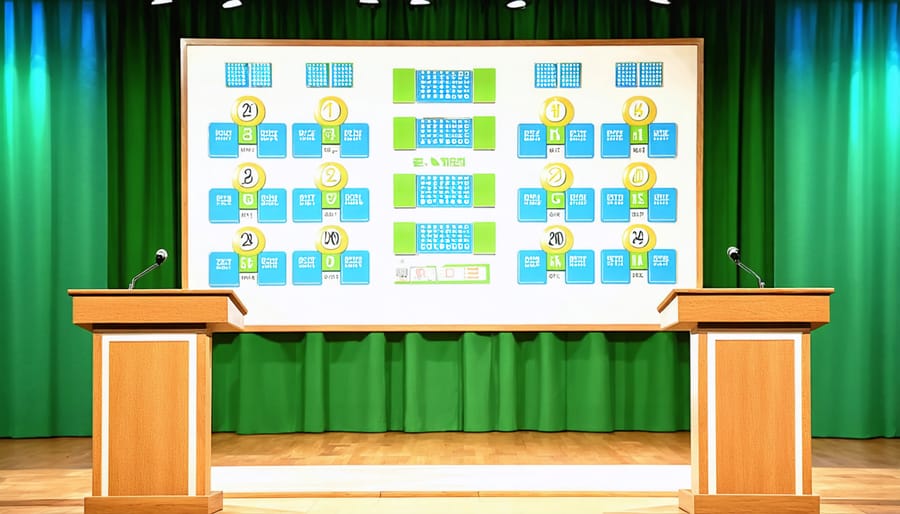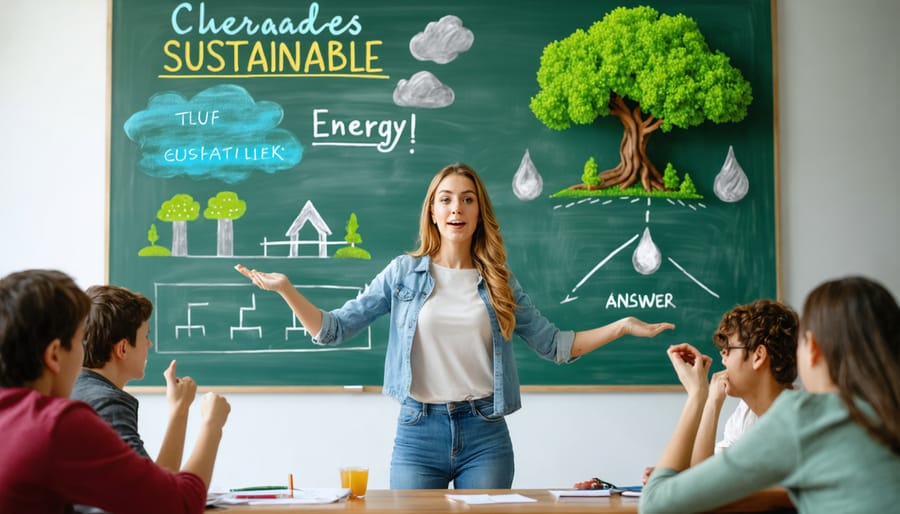Transform your sustainable energy lessons with engaging review games that captivate students and reinforce key concepts. From classic trivia-style competitions to immersive digital adventures, what are review games? They are powerful tools to assess understanding, identify knowledge gaps, and create memorable learning experiences centered around renewable energy sources. Implement team-based challenges that foster collaboration and critical thinking as students race against the clock to demonstrate their mastery of sustainable energy principles. Utilize interactive platforms and gamification elements to create a dynamic, competitive atmosphere that drives participation and enhances retention. By harnessing the power of review games, educators can ignite a passion for sustainable energy and equip the next generation with the knowledge and skills to build a greener future.
Renewable Energy Jeopardy
Game Setup
To set up the sustainable energy review game board, start by selecting categories that cover key topics such as solar power, wind energy, hydroelectric power, geothermal energy, and energy efficiency. Write each category at the top of a column on the game board. Next, create point values for each question, typically ranging from 100 to 500 points, with higher values corresponding to more challenging questions. Write these point values in ascending order down each category column.
When crafting questions for each category and point value, ensure they are clear, fact-based, and vary in difficulty. For example, a 100-point question under the solar power category could be “What is the primary energy source for solar panels?” while a 500-point question might ask “What is the average efficiency of a multi-junction solar cell under ideal conditions?” Double-check the accuracy of each question and answer before finalizing the game board.
To add an extra layer of interaction and strategy, consider including a “Daily Double” or “Final Jeopardy” style question for each category. These special questions allow players to wager their points, adding an element of risk and reward to the game. With the categories, point values, and questions in place, your sustainable energy review game board is ready for an engaging and educational gameplay experience.

Question Examples
Here are some engaging question examples for each category in sustainable energy review games:
Renewable Energy Sources:
– What are the three main types of solar energy technology? (Answer: Photovoltaics, solar heating & cooling, concentrating solar power)
– True or False: Wind turbines can operate effectively at any wind speed. (Answer: False – wind speeds of 13-90 km/h are ideal)
Energy Efficiency:
– Approximately how much more energy efficient are LED light bulbs compared to traditional incandescent bulbs? (Answer: 75-80% more efficient)
– What is the most effective way to reduce heat loss in your home? (Answer: Adding insulation, sealing air leaks)
Sustainable Transportation:
– How many kilometers can most modern electric cars travel on a single charge? (Answer: 200-500 km)
– What renewable fuel can be used in modified diesel engines with little to no modifications? (Answer: Biodiesel)
Green Building Practices:
– What internationally recognized green building rating system assesses sustainability in design, construction and operation? (Answer: LEED – Leadership in Energy and Environmental Design)
– True or False: Green roofs can help reduce a building’s energy consumption. (Answer: True – through insulation and reducing cooling needs)
Climate Change Mitigation:
– What percentage of global greenhouse gas emissions are caused by deforestation? (Answer: Approximately 10-15%)
– Which of the following is NOT a major greenhouse gas? A) Carbon dioxide B) Methane C) Water vapor D) Nitrogen (Answer: D) Nitrogen)
Create bonus questions by combining topics across categories for added challenge and integrated learning. Craft questions to reinforce key concepts while fostering curiosity to explore sustainable energy further.
Sustainable Energy Trivia Showdown
The Sustainable Energy Trivia Showdown is a fast-paced, interactive game designed to test and reinforce players’ knowledge of renewable energy facts, figures, and innovations. To begin, divide participants into teams of 3-4 players each. The game consists of multiple rounds, with each round focusing on a specific category such as solar power, wind energy, hydroelectricity, geothermal energy, or biofuels.
In each round, the host presents a series of multiple-choice or true/false questions, challenging teams to quickly collaborate and select the correct answer within a limited time frame (e.g., 30 seconds per question). Questions can range from basic definitions and concepts to more advanced topics like cutting-edge technologies, energy efficiency statistics, and real-world applications.
For example, a question might ask, “What percentage of the world’s electricity is currently generated by wind power? A) 2.5%, B) 5%, C) 10%, or D) 20%.” Teams earn points for each correct answer, with the possibility of bonus points for particularly challenging questions or lightning rounds.
Between rounds, the host can share brief, informative anecdotes or case studies related to sustainable energy, helping to contextualize the trivia questions and keep participants engaged. The game concludes with a final round where the stakes are higher, and teams have the opportunity to wager their points on more difficult questions.
Throughout the Sustainable Energy Trivia Showdown, players not only reinforce their existing knowledge but also learn new and fascinating facts about the rapidly evolving world of renewable energy. By fostering a competitive yet collaborative atmosphere, this game encourages participants to actively engage with the subject matter and develop a deeper understanding of the importance and potential of sustainable energy solutions.

Wind and Solar Power Pictionary
Wind and Solar Power Pictionary is an exciting and educational game that challenges players to draw and guess terms related to wind and solar energy technologies. To set up the game, create a list of relevant terms such as solar panels, wind turbines, photovoltaic cells, inverters, generators, and energy storage systems. Divide players into teams and have each team take turns selecting a term to draw while their teammates attempt to guess the word or phrase.
As the game progresses, introduce more complex concepts like the environmental benefits of wind and solar power, such as reduced greenhouse gas emissions, improved air quality, and the conservation of water resources. Players can also illustrate the challenges associated with these renewable energy sources, including intermittency, land use requirements, and the need for efficient energy storage solutions.
To make the game more engaging, incorporate bonus rounds where players must draw and guess terms related to specific aspects of wind and solar power, such as the components of a solar panel or the process of wind energy conversion. Encourage players to discuss the significance of each term and share their knowledge about the role of renewable energy in mitigating climate change and promoting sustainable development.
By participating in Wind and Solar Power Pictionary, players will not only enhance their understanding of these clean energy technologies but also develop a deeper appreciation for the importance of transitioning to a low-carbon future. This game serves as an entertaining and informative way to raise awareness about the potential of wind and solar power in creating a more sustainable and resilient world.

Green Energy Charades
Green Energy Charades is a fun and engaging way to learn about sustainable energy concepts. To play, divide participants into teams and have each team write down various renewable energy terms, technologies, or concepts on slips of paper. These could include solar panels, wind turbines, geothermal energy, energy efficiency, or even specific renewable energy projects.
Teams take turns selecting a slip of paper and acting out the term without speaking, while their teammates attempt to guess the concept. The acting team can use creative gestures and movements to convey the idea, making complex topics more relatable and memorable.
For example, to act out “solar panels,” a player might pretend to be a panel tilting towards the sun, or to represent “wind turbines,” they could spin their arms like blades. “Energy efficiency” could be portrayed by miming actions like turning off lights or insulating a house.
This game encourages participants to think critically about sustainable energy concepts and break them down into understandable components. It also sparks discussion and collaboration as teammates work together to decipher the clues.
Green Energy Charades is adaptable for various age groups and knowledge levels. The terms can be adjusted to suit the audience, from basic concepts for beginners to more advanced terminology for experienced players. The game can be played in classrooms, at community events, or even as a team-building exercise for organizations focused on sustainability.
By transforming complex sustainable energy ideas into a lively, interactive game, Green Energy Charades makes learning about renewable resources both educational and entertaining. It’s a great way to get people excited about the potential of clean energy solutions and inspire them to take action in their own lives and communities.
Renewable Energy Role-Play
In the “Renewable Energy Role-Play” game, participants take on the roles of key stakeholders in the sustainable energy sector, such as renewable energy developers, utility companies, environmentalists, policymakers, and concerned citizens. The objective is to engage in a constructive dialogue, negotiate, and make decisions that balance economic, environmental, and social considerations.
Each player receives a character profile outlining their role’s goals, priorities, and challenges. For example, a wind farm developer may prioritize securing land and permits, while an environmentalist focuses on minimizing the impact on local ecosystems. Policymakers must navigate political pressures and constituent concerns, and utility companies aim to ensure a reliable and affordable energy supply.
The game moderator presents a scenario, such as a proposal for a new solar power plant or a debate on renewable energy subsidies. Players then engage in a structured discussion, presenting their perspectives, asking questions, and seeking common ground. They must grapple with real-world challenges like balancing intermittent renewable energy sources with baseload power, addressing community concerns, and securing financing.
Throughout the role-play, participants gain insights into the complexities of the energy transition and the importance of collaboration and compromise. The game can be adapted to various settings, from classrooms to professional workshops, and can be followed by a debrief session to reflect on key lessons and insights.
By fostering empathy, critical thinking, and problem-solving skills, the “Renewable Energy Role-Play” game offers a powerful tool for education and stakeholder engagement in the pursuit of a sustainable energy future.
Conclusion
Review games are a powerful tool for teaching about sustainable energy in a way that is both informative and engaging. By incorporating elements of play, competition, and collaboration, these games make learning about renewable energy sources more memorable and enjoyable. Participants gain a deeper understanding of the benefits and challenges associated with different sustainable energy technologies, empowering them to make more informed decisions in their personal lives and advocate for cleaner energy policies.
Whether you are an educator looking to inspire your students, a renewable energy enthusiast seeking to spread awareness, or an individual curious about sustainable solutions, incorporating review games into your learning journey can make a significant difference. By actively participating in these games, you will not only reinforce your own knowledge but also be better equipped to educate others about the importance of transitioning to a more sustainable future.
So, take the first step towards making learning about sustainable energy more engaging and effective. Explore the various review games available, adapt them to your specific context, and witness the power of play in driving meaningful change. Together, we can create a more informed and motivated community of sustainable energy advocates, one game at a time.





